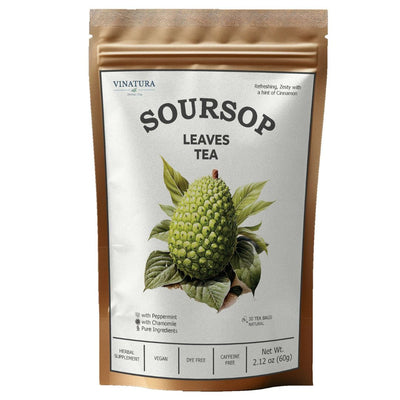
How To Make Black Walnut Tea At Home?
Black Walnut tea is a beverage with remarkable health benefits, including antifungal, anti-oxidant properties and parasite cleansing, yet it is not widely known. This article will highlight the incredible benefits of Black Walnut tea and guide you on how to prepare this drink at home for daily use.
Before exploring further, please read the disclaimer located at the end of this webpage.
Key Takeaways
- Black Walnut tea is made from the leaves of Black Walnut trees, renowned for their potent medicinal properties.
- Black Walnut tea can support heart health, aid weight management, and regulate blood sugar levels.
- A simple recipe and ingredients guide you to easily make Black Walnut tea at home.
What Is Black Walnut Tea?

Black Walnut tea is a beverage brewed from the leaves of the Black Walnut tree—a species native to North America and closely related to walnuts. This tea derives its rich nutrients from Black Walnuts, containing compounds like tannins, juglone, and various vitamins that provide numerous health benefits.
Historically, this tea has been used to manage intestinal issues, support cardiovascular health, and regulate blood sugar levels. When combined with mugwort or clove, it has been known to help eliminate parasites.
How To Make Black Walnut Tea
Black Walnut Tea Ingredients
Black Walnut tea is prepared using the leaves of Black Walnuts—the protective casing of the nutrient-rich walnut, which also retains moisture to blend well with tea. Ingredients include:
- Black Walnut leaves (fresh or dried)
- Water: Clean water; tea experts recommend pure water for richer flavor and a lasting aftertaste.
- Additional ingredients: Honey, dates, lemon, ginger, or other preferences to enhance flavor and nutritional value.
Read more: 9 Best Black Walnut Supplements for Digestive Health
Black Walnut Tea Recipe
The process of making Black Walnut tea is straightforward, resembling most herbal tea preparations:
- Prepare ingredients: Select mature walnuts with intact leaves (not wilted), wash the outer leaves thoroughly with clean water, and dry them for tea preparation.
- Boil water: Heat an appropriate amount of water for the tea. Typically, 1-1.5 liters of water mixed with 3-6 walnut leaves suffices for 3-6 servings in the morning.
- Steep the leaves: After cleaning, boil the leaves in water for 10-15 minutes until the tea darkens and emits a mild aroma. You can either let it steep or drink it immediately.
- Filter the tea: Before drinking, strain out the leaves and add your preferred ingredients to enhance flavor.
Tips For Making Black Walnut Tea
Additionally, here are some helpful tips to successfully brew a pot of particularly flavorful Black Walnut tea while preserving its nutrients:
- Select High-Quality Leaves: Use leaves that are neither overly dry nor overly moist for brewing. You can determine this by touch or visual inspection when purchasing. Overly dry leaves tend to shrivel, while excessively moist leaves may feel damp on the surface. Both conditions can affect the tea's flavor.
- To make the tea richer and more flavorful, steep it for a short period of 5-10 minutes. This enhances the taste slightly and keeps the tea warm at a moderate temperature, avoiding burns when consumed.
What Is Black Walnut Tea Good For?

Thanks to the antibacterial, antifungal, and antioxidant properties of Black Walnuts, the tea brings significant health benefits, particularly for digestive health and immune support.
In addition, many studies suggest that Black Walnuts have positive effects on skin pigmentation and potential anticancer properties. However, further scientific evidence is needed to confirm these benefits. To clarify the health advantages of Black Walnuts, we will explore them in more detail in the following sections.
Black Walnut Tea Nutrition
Black Walnut tea is primarily made from Black Walnut leaves, which are rich in nutrients, including compounds like tannins, juglone, and polyphenols [1]. Additionally, it contains a significant amount of omega-3. These components have specific benefits:
- Tannins: Known for their antioxidant properties.
- Juglone: Exhibits strong antifungal and antibacterial effects.
- Omega-3: Supports cardiovascular health.
Moreover, Black Walnut tea is often consumed alongside the walnut itself, which is rich in nutrients like B vitamins, vitamin B6, vitamin E, and riboflavin. It also provides healthy polyunsaturated fats that are beneficial for the body.
8 Black Walnut Tea Benefits
Antifungal
Tea containing Black Walnut extracts inherits potent antifungal properties from the Black Walnut itself: “Juglone present in walnuts plays a significant role in health. It exhibits antifungal, antiparasitic, and antibacterial effects... Juglone has a broad spectrum of antibacterial activity and is effective against gram-positive microorganisms (Staphylococcus aureus, Streptococcus mutans), gram-negative microorganisms (Escherichia coli, Pseudomonas aeruginosa), and pathogenic yeasts (Candida albicans)” [3].
Heart Health
Scientific references mention that “Consumption of Black Walnuts may exert a beneficial effect on human vascular function” [4]. This implies the potential benefits Black Walnut tea may offer for cardiovascular health. Combined with its anti-oxidant properties, it may help reduce symptoms of heart, vascular, or myocardial damage.
Weight Management
Nutritionally, Black Walnuts are a rich source of vitamins, specifically folic acid, vitamin B5, vitamin B6, and tocopherols, along with minerals like phosphorus, manganese, magnesium, zinc, and potassium, omega-3 fatty acids, and phytochemicals [5]. This makes it a dietary product that ensures sufficient nutrition without contributing excessive fats to the body.
Skin Lightening
Black Walnuts exhibit strong antioxidant properties. Long-term use of Black Walnut tea can help skin cells combat free radicals and the harmful effects of sunlight, promoting healthier, brighter skin [6].
Help Gut Bacteria
Research proves that Black Walnuts have powerful effects in inhibiting the growth of gut-endogenous bacteria, supporting intestinal disorders, bile pain, dysbiosis, etc. [7].
Blood Sugar Regulation
Many sources suggest that this product may help regulate blood sugar levels. However, further studies and scientific evidence are needed to confirm this claim.
Parasite Reduction
The hull and leaves of Black Walnuts contain two main compounds—tannins and juglone—which possess astringent and moisture-absorbing properties that damage the protective layer of parasites, ultimately eliminating them from the digestive tract via natural excretion processes [8].
Anticancer
A study of Black Walnut extracts revealed that: “Two phenolic compounds, penta-O-galloyl-β-d-glucose and quercetin 3-β-d-glucoside, exhibited antiproliferative activity against both cancerous alveolar epithelial cells (A549) and non-cancerous lung fibroblasts (MRC-5).” Thus, Black Walnut tea shows potential for supporting cancer suppression [9].
What Does Black Walnut Tea Taste Like?
Black Walnut tea has a flavor profile similar to most herbal teas, with a slightly bitter and astringent taste. The intensity of bitterness and astringency can vary depending on the concentration of the leaves used.
However, the flavor can be modified by adding ingredients such as honey, dates, lemon, ginger, etc. You can even add sugar if you have a sweet tooth and dislike bitter flavors to make the tea more enjoyable.
Walnut Leaf Tea Side Effects
Like most teas, Black Walnut tea contains a small amount of caffeine, making insomnia one of the most common and noticeable side effects. Additionally, it may cause other issues, such as:
- Digestive Problems: High doses can cause nausea or stomach discomfort.
- Allergies: Individuals allergic to nuts should avoid consuming Black Walnut tea.
- Pregnancy and Breastfeeding: It is not recommended for pregnant or breastfeeding women to ensure safety for both mother and baby.
Moreover, extracts from Black Walnut leaves and other parts of the tree (such as the roots, inner bark, nutshells, and leaves) contain a nontoxic chemical called hydroquinone. When exposed to soil or air, this compound can convert into juglone. In moderate, stable amounts, this chemical offers benefits, but excessive use can irritate. Thus, it’s advisable to use only an appropriate amount of walnut leaves when making tea.
Frequently Asked Questions
Who Should Not Drink Black Walnuts Tea?
TAs mentioned earlier, individuals allergic to nuts or those with digestive issues, as well as pregnant or breastfeeding women, should consult a doctor before consumption.
What is the Best Use of Black Walnuts?
Black Walnuts are primarily used for antifungal and antiparasitic properties and to balance and improve digestive health. Notably, they are a popular ingredient in traditional medicine.
Does Black Walnut Tea Help You Sleep?
There is no specific evidence or statistics to prove this. On the contrary, the caffeine in the tea may even cause difficulty sleeping for those sensitive to caffeine.
Is Black Walnut Tea Safe for the Liver?
Black Walnut is generally considered as safe as other foods. However, consulting healthcare professionals for specific recommendations is advised.
Is Black Walnut an Antibiotic?>
No, but compounds in Black Walnuts exhibit strong antibacterial properties.
Conclusion
See? Brewing a pot of Black Walnut tea to enjoy on a cold winter morning and keeping warm while reaping health benefits isn’t difficult, is it? With simple and easy steps, Black Walnut tea can brighten your skin tone, support digestive health, and counteract various health issues such as fungi and parasites. However, don’t forget to consult healthcare professionals to carefully consider the benefits of this product!
References
- [1] LegCharacteristics of Leguminous Nuts and Seeds. https://f.ucr.edu/~legneref/botany/leg.htm.
- [2] [4] Vu, Danh C., et al. “An Overview of Phytochemicals and Potential Health-promoting Properties of Black Walnut.” RSC Advances, vol. 10, no. 55, Jan. 2020, pp. 33378–88. https://doi.org/10.1039/d0ra05714b.
- [3] “Current Aspects of the Medical Application of Walnut (Juglans Regia L.) and Black Walnut (Juglans Nigra L.) (Review).” Zenodo, July 2024, https://doi.org/10.5281/zenodo.10257429.
- [5] USDA, U.S. Department of Agriculture Nutrient DataBase, http://ndb.nal.usda.gov/ndb/search, accessed May 20, 2019
- [6] [9] Ho, Khanh-Van, et al. “Profiling Anticancer and Antioxidant Activities of Phenolic Compounds Present in Black Walnuts (Juglans Nigra) Using a High-Throughput Screening Approach.” Molecules, vol. 25, no. 19, Oct. 2020, p. 4516. https://doi.org/10.3390/molecules25194516.
- [7] A. R. Hutchens, A Handbook of Native American Herbs: The Pocket Guide to 125 Medicinal Plants and Their Uses, Shambhala Publications, 1992
- [8] Sharma M, Sharma M, Sharma M. A comprehensive review on ethnobotanical, medicinal and nutritional potential of walnuts (Juglans regia L.). Proc.Indian Natl. Sci. Acad. 2022;88(4):601–16. doi: 10.1007/s43538-022-00119-9. Epub 2022 Sep 22. PMCID: PMC9510174.
Author

Product Disclaimer
Including an ingredient or study does not evaluate, endorse, or recommend any Vinatura product or any third-party product. Some ingredients discussed may not be used in any Vinatura product.
The content of the articles has not been evaluated by the Food and Drug Administration (FDA) and is not intended to promote or endorse any specific product. Any products sold on this website are not intended to diagnose, treat, cure, or prevent any disease.
Opinions and Endorsements
Any claims, statements, or opinions expressed in the articles are those of the author(s) and do not necessarily reflect the views or opinions of the manufacturers of the dietary supplement products. The products sold on this website are separate from the content of the articles and are not directly endorsed or associated with the information presented here.
Liability Disclaimer
The author(s) of the articles, website, and manufacturers of the dietary supplement products do not assume any liability for any potential consequences arising from the use of the information provided in the articles. Ingredient effects, dosages, and safety vary by individual, formulation, and context; some ingredients interact with medications or may be unsuitable during pregnancy or lactation. It is recommended that individuals consult with a qualified healthcare professional before making any dietary or lifestyle changes, including the use of dietary supplements.
Product Usage
Please refer to the product labels and packaging for specific usage instructions and guidelines for the dietary supplement products sold on this website.
Customer Support
For any concerns or questions regarding the dietary supplement products, please contact our customer support team, who will be more than happy to assist you.





Leave a Comment
Be the first to comment.
What do you think?